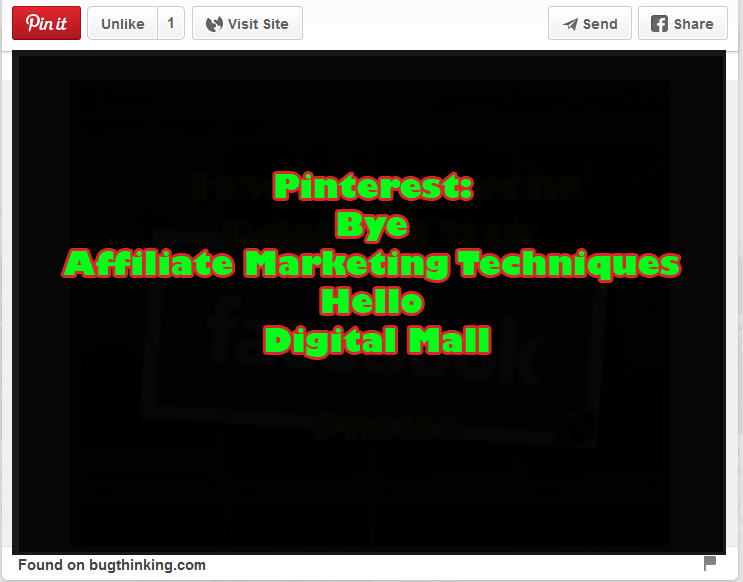Page Contents
No Sorry for you, Bye Affiliate Marketing Techniques – Pinterest
Probably this will be the saddest news for one of your affiliate marketing techniques if you’re doing it on Pinterest. You might have affiliate membership from other online services like Amazon, ClickBank, hosting like HostGator, and many more. And possibly one of your affiliate marketing techniques is to post and share your affiliate link to earn money. Or it can be a case where you’re a blogger who shares content in Pinterest. But on your post, you have there a link that will redirect readers to a website where you will gain a cut of the sale after your reader buys something. Unfortunately, Pinterest started to ban this kind of affiliate marketing techniques. You heard me right!
According to Harrison Weber/VentureBeat’s report, a spokesperson from Pinterest gave them this statement about the issue:
“We are removing affiliate links to ensure we’re providing the best possible experience for Pinners. Recently, we observed affiliate links and redirects causing irrelevant Pins in feeds, broken links and other spammy behavior. We believe this change will enable us to keep the high bar of relevancy and quality Pinners expect from Pinterest.”
As expected, most of the Pinterest power or top “pinners” who have been with this popular online visual bookmark or board gave their negative reactions. Simply because one of their affiliate marketing techniques will no longer work in Pinterest. Sorry, no more affiliate paycheck for now.
Historically, this is not the first time the company has banned affiliate links. However this time they were serious about it and issued a “total ban”. Why haven’t I thought of that a best affiliate marketing program can be posted in Pinterest long ago? 🙂
Business Insider posted some tweets of those pinners who have been less impressed with the company’s move against affiliate links. Well, who can blame them especially if what they’re pinning and sharing are legit and one of the best affiliate marketing program there is.
As I’ve mentioned, this was not the first time the company banned such actions from their pinners. Do you think there’s a deeper reason for this?
Soon to come this year – Pinterest’s “Buy” Button
So, that’s the reason I was seeking for – probably! Jason Del Rey of Re/Code just reported that Pinterest will soon launch the “Buy” button. It seems that Pinterest is planning to launch their own monetization program. From a simple online visual bookmarking site and now the company plans to build an e-commerce site.
The “Buy” button may start to show in Pinterest three to six months, according to the report.
Imagine this, Pinterest is said to be getting 70 million visits monthly. And pinners saves or share almost anything that interest them such as new gadgets, websites, clothing, accessories, places, recipes, and many more. With that amount of traffic every month then it is possible that Pinterest will do good with their plan. I don’t have to be a mathematician to compute the possibilities of someone hitting that “Buy” button.
The plan is that the user don’t have to get out from the platform whenever he or she finds something interesting to buy.
Conflict of Interest
This is just me speaking. I’ve been with Pinterest for a long time (or just long enough). And just to note, the following is purely my opinion. I’ve seen it grow overtime and I am a happy pinner because I am able to share my articles. However, it seems that the two news were “related” and I can’t exclude that there’s a conflict of interest here. With other pinner’s affiliate marketing techniques, they will post a link and once a user clicks that the user gets out from Pinterest platform. The pinner earns money out of it especially if the user buys something. Probably, just maybe, Pinterest saw this pattern and realized that it will benefit the company if they can have some monetization program of their own. Kicking out affiliate links or programs will eliminate competition.
In the end, like other social media platforms such as Facebook, Instagram, Twitter and many more Pinterest is free for all. That means it’s not really for us users to decide what they want to do with their services. It’s entirely their prerogative.
My only two cents, why can’t they just let pinners do continue their affiliate marketing techniques. I mean, it’s really up to the end-user to decide whether he wants to proceed with buying an interesting product even if it is an affiliate link. Moreover, what’s the purpose of the Report button? The end-users can always and should report violators or spammy links. Disable or ban bad users, or something like that.
What’s your reaction about this?

